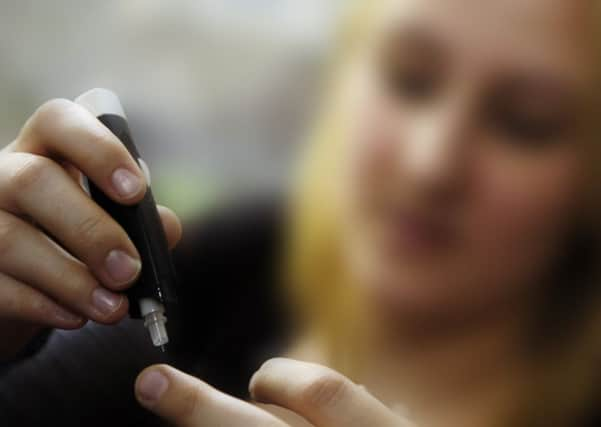Type 1 diabetes: Scottish study could revolutionise treatment


Currently when someone is diagnosed with the condition, there is no way to predict whether they will go on to develop complications such as sight loss, kidney damage and heart disease.
Now a new study, led by Professor Helen Colhoun from the University of Dundee, will use new highly sensitive blood testing techniques to identify who is most as risk of developing these life-threatening side effects.
Advertisement
Hide AdAdvertisement
Hide AdScotland has the third highest incidence of type 1 diabetes in the world, with over 28,500 Scots living with the condition.


The illness, caused by the destruction of insulin producing cells in the pancreas, causes a person’s blood sugar glucose level to become too high. Unllike type 2 diabetes, which can sometimes be controlled by diet, people with type 1 have to inject themselves with insulin for the rest of their lives.
It it not fully understood why certain people develop the condition, but it is believed a mix of genetic and environmental factors can contribute.
Cases of diabetes are on the rise, and it is predicted that between 2005 and 2020, the number of new diagnosis in young children under the age of five in Scotland will have doubled.


Prof Colhoun, hopes in the future that people who carry this increased risk could be identified early and treated to stop complications developing.
6,000 people have been recruited for the study - around a third of those with the condition in Scotland. It was funded by type 1 diabetes charity JDRF , Diabetes UK and the Chief Scientist Office.
She said: “Life expectancy in people with type 1 diabetes is improving, complication rates have improved - but there are still some people susceptible to developing complications.
“The focus of my research is to try to reduce the impact of diabetes and to try to prevent complications - we are looking at reasons why these complications develop in certain people and identifying who is most at risk.”
Advertisement
Hide AdAdvertisement
Hide AdUntil recently, it was believed that people with type 1 diabetes had no insulin producing cells in their pancreas, but the scientists have discovered that a large proportion of the people with the disease actually had a low level of background insulin producing cells.
“This holds great hope for the future,” Prof Colhoun explaines, “It means we might be able to better understand type 1 diabetes and how to improve treatment.
“These trials could be hugely important for predicting where we should tailor resources and reduce the burden for people with diabetes.”
Although the cause of a rise in type 1 diabetes cases is not fully understood, Prof Colhoun said a lack of vitamin d could be a factor.
She said: “There is an increase in incidence of type 1 diabetes in northern hemisphere countries. There is moderate evidence that vitamin D levels have some role to play. People who are low in vitamin D, if they have the genetic makeup and environmental insult, may be more at risk.
Although the study could mark a huge step forward in the treatment of diabetes, Prof Colhoun warned a cure was not just around the corner.
“There is still a way to go to get to a stage where type 1 diabetes has no impact on your life expectancy,” she said.
Rachel Connor is head of research communication of JDRF in the UK. This study is one of a number of projects that the type 1 diabetes charity is funding in Scotland to a total of £3.9million.
Advertisement
Hide AdAdvertisement
Hide AdShe said: “We know now that some people can live with type 1 diabetes for 50 years and experience no complications at all.
“We want to find out how to give everyone with type 1 the same chance of living complication-free.”